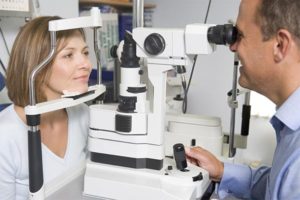Eye Diseases
A quick look at some of the most common eye diseases diagnosed and often treated at Primary EyeCare Associates in Horsham
 “Eye diseases” is a blanket term that refers to a host of diseases relating to the function of the eye. Below we describe some of the more common types of eye diseases and how they are generally treated. For more in-depth information, please speak with your eye care provider at Primary EyeCare Associates.
“Eye diseases” is a blanket term that refers to a host of diseases relating to the function of the eye. Below we describe some of the more common types of eye diseases and how they are generally treated. For more in-depth information, please speak with your eye care provider at Primary EyeCare Associates.
Dry Eye Disease
Do your eyes often feel dry, have a stinging sensation, or feel scratchy? You may have dry eye syndrome (keratoconjunctivitis sicca), a condition that can occur when the tear glands don’t produce the correct quantity or quality of tears. Dry eye syndrome is a chronic lack of moisture in the eye. If left untreated, dry eye syndrome may weaken vision and lead to eye infections.
If you or someone you know works on computers you need to come in for a dry eye workup. This comprehensive dry eye exam will give you the best insight into your eye health. We have seen an increase of computer users coming in for eye issues and have been diagnosed as having dry eye disease. Come find out more about your eye health today. Schedule an Appointment
Treatment of evaporative dry eye varies depending on the severity and centers around treating the underlying problem, the incorrectly functioning meibomian glands. We offer the only FDA approved LipiFlow treatment that helps evaporative dry eye patients by treating the cause, not the symptoms.
In a clinical study, 79% of patients reported improved overall dry eye symptoms (ranging from 10% to 100% improvement) within four weeks of a single LipiFlow treatment. LipiFlow Thermal Pulsation technology applies heat to the inner eyelids and gentle pressure, releasing lipids from the Meibomian glands. The procedure is fast, virtually painless, and takes place right in a doctor’s office.
Conjunctivitis (Pink Eye)
Conjunctivitis, also known as pink eye, is an infection or inflammation of the conjunctiva – the thin, protective membrane that covers the surface of the eyeball and inner surface of the eyelids. Caused by bacteria, viruses, allergens and other irritants like smoke and dust, pink eye is highly contagious and is usually accompanied by redness in the white of the eye and increased tearing and/or discharge.
While many minor cases improve within two weeks, some can develop into serious corneal inflammation and threaten sight. If you suspect conjunctivitis, visit your eye care provider at Primary EyeCare Associates for an examination and treatment.
Diabetic Eye Disease
Diabetic eye disease is a general term for a group of eye problems that can result from having type 1 or type 2 diabetes, including diabetic retinopathy, cataracts and glaucoma.
Often there are no symptoms in the early stages of diabetic eye disease, so it is important that you don’t wait for symptoms to appear before having a comprehensive eye exam. Early detection and treatment of diabetic eye disease will dramatically reduce your chances of sustaining permanent vision loss.
Glaucoma
Often called “the silent thief of sight,” glaucoma is an increase in the intraocular pressure of the eyes, which causes damage to the optic nerve with no signs or symptoms in the early stages of the disease. If left untreated, glaucoma can lead to a decrease in peripheral vision and eventually blindness.
While there is no cure for glaucoma, there are medications and surgery available that can help halt further vision loss. Early detection and regular eye exams are vital to slowing the progress of the disease.
Macular Degeneration
Macular degeneration is a chronic, progressive disease that gradually destroys sharp central vision due to a deterioration of the macula, a tiny spot in the central portion of your retina comprised of millions of light-sensing cells. Because it is so commonly associated with aging, it is also known as age-related macular degeneration (AMD). There are two forms of AMD called “dry,” most common and with no known treatment, and “wet,” less common and treated with laser procedures. Genetic testing is now available to help identify those most likely to develop “wet” macular degeneration.
In most cases, reversing damage caused by AMD is not possible, but supplements, protection from sunlight, eating a balanced diet and quitting smoking can reduce the risk and progression of macular degeneration. For suggestions, speak with your eye care provider at Primary EyeCare Associates.
Primary EyeCare Associates has the experience and equipment necessary to diagnose and often treat the eye diseases detailed above, as well as many other eye diseases, at our office in Horsham. For more information pleaseschedule an appointment with your optometrist, and we’ll be in touch with you shortly.


